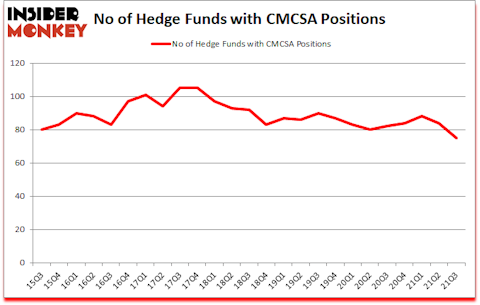How do you pick the next stock to invest in? One way would be to spend days of research browsing through thousands of publicly traded companies. However, an easier way is to look at the stocks that smart money investors are collectively bullish on. Hedge funds and other institutional investors usually invest large amounts of capital and have to conduct due diligence while choosing their next pick. They don’t always get it right, but, on average, their stock picks historically generated strong returns after adjusting for known risk factors. With this in mind, let’s take a look at the recent hedge fund activity surrounding Comcast Corporation (NASDAQ:CMCSA) and determine whether hedge funds had an edge regarding this stock.
Is Comcast Corporation (NASDAQ:CMCSA) a safe stock to buy now? The best stock pickers were taking a bearish view. The number of long hedge fund positions were trimmed by 9 lately. Comcast Corporation (NASDAQ:CMCSA) was in 75 hedge funds’ portfolios at the end of the third quarter of 2021. The all time high for this statistic is 105. Our calculations also showed that CMCSA isn’t among the 30 most popular stocks among hedge funds (click for Q3 rankings). There were 84 hedge funds in our database with CMCSA holdings at the end of June.

Boykin Curry of Eagle Capital
At Insider Monkey, we scour multiple sources to uncover the next great investment idea. For example, lithium prices have more than doubled over the past year, so we go through lists like the 10 best EV stocks to pick the next Tesla that will deliver a 10x return. Even though we recommend positions in only a tiny fraction of the companies we analyze, we check out as many stocks as we can. Now we’re going to take a look at the key hedge fund action encompassing Comcast Corporation (NASDAQ:CMCSA).
Do Hedge Funds Think CMCSA Is A Good Stock To Buy Now?
At third quarter’s end, a total of 75 of the hedge funds tracked by Insider Monkey were long this stock, a change of -11% from one quarter earlier. The graph below displays the number of hedge funds with bullish position in CMCSA over the last 25 quarters. With hedgies’ capital changing hands, there exists an “upper tier” of noteworthy hedge fund managers who were upping their stakes substantially (or already accumulated large positions).

Among these funds, Eagle Capital Management held the most valuable stake in Comcast Corporation (NASDAQ:CMCSA), which was worth $1614.4 million at the end of the third quarter. On the second spot was Trian Partners which amassed $1118.1 million worth of shares. Egerton Capital Limited, Orbis Investment Management, and Arrowstreet Capital were also very fond of the stock, becoming one of the largest hedge fund holders of the company. In terms of the portfolio weights assigned to each position JNE Partners allocated the biggest weight to Comcast Corporation (NASDAQ:CMCSA), around 17.72% of its 13F portfolio. 3G Sahana Capital Management is also relatively very bullish on the stock, earmarking 16.84 percent of its 13F equity portfolio to CMCSA.
Due to the fact that Comcast Corporation (NASDAQ:CMCSA) has faced declining sentiment from the aggregate hedge fund industry, it’s safe to say that there exists a select few money managers who were dropping their positions entirely in the third quarter. Interestingly, Matthew Stadelman’s Diamond Hill Capital dumped the biggest stake of the 750 funds watched by Insider Monkey, totaling close to $366 million in stock. Steve Cohen’s fund, Point72 Asset Management, also dropped its stock, about $68 million worth. These transactions are important to note, as total hedge fund interest fell by 9 funds in the third quarter.
Let’s also examine hedge fund activity in other stocks – not necessarily in the same industry as Comcast Corporation (NASDAQ:CMCSA) but similarly valued. We will take a look at Royal Dutch Shell plc (NYSE:RDS), Exxon Mobil Corporation (NYSE:XOM), Toyota Motor Corporation (NYSE:TM), Pfizer Inc. (NYSE:PFE), Oracle Corporation (NASDAQ:ORCL), NIKE, Inc. (NYSE:NKE), and Cisco Systems, Inc. (NASDAQ:CSCO). This group of stocks’ market valuations are closest to CMCSA’s market valuation.
| Ticker | No of HFs with positions | Total Value of HF Positions (x1000) | Change in HF Position |
|---|---|---|---|
| RDS | 33 | 2053904 | -5 |
| XOM | 64 | 4640444 | -4 |
| TM | 10 | 876130 | -2 |
| PFE | 74 | 2662716 | 7 |
| ORCL | 56 | 3473487 | 1 |
| NKE | 70 | 5682126 | 3 |
| CSCO | 63 | 3937668 | 3 |
| Average | 52.9 | 3332354 | 0.4 |
View table here if you experience formatting issues.
As you can see these stocks had an average of 52.9 hedge funds with bullish positions and the average amount invested in these stocks was $3332 million. That figure was $8547 million in CMCSA’s case. Pfizer Inc. (NYSE:PFE) is the most popular stock in this table. On the other hand Toyota Motor Corporation (NYSE:TM) is the least popular one with only 10 bullish hedge fund positions. Compared to these stocks Comcast Corporation (NASDAQ:CMCSA) is more popular among hedge funds. Our overall hedge fund sentiment score for CMCSA is 67.4. Stocks with higher number of hedge fund positions relative to other stocks as well as relative to their historical range receive a higher sentiment score. Our calculations showed that top 5 most popular stocks among hedge funds returned 95.8% in 2019 and 2020, and outperformed the S&P 500 ETF (SPY) by 40 percentage points. These stocks gained 29.6% in 2021 and still beat the market by 3.6 percentage points. Unfortunately, CMCSA wasn’t nearly as popular as these 5 stocks and hedge funds that were betting on CMCSA were disappointed as the stock returned -9.8% since the end of the third quarter (through 1/31) and underperformed the market. If you are interested in investing in large cap stocks with huge upside potential, you should check out the top 5 most popular stocks among hedge funds as all of these stocks already outperformed the market since 2019.
Follow Comcast Corp (NASDAQ:CMCSA)
Follow Comcast Corp (NASDAQ:CMCSA)
Receive real-time insider trading and news alerts
Suggested Articles:
- Top 10 Dividend Stocks That Pay Monthly
- 16 Best Luxury Resorts in Caribbean in 2021
- 30 Most Religious Cities in the US
Disclosure: None. This article was originally published at Insider Monkey.





